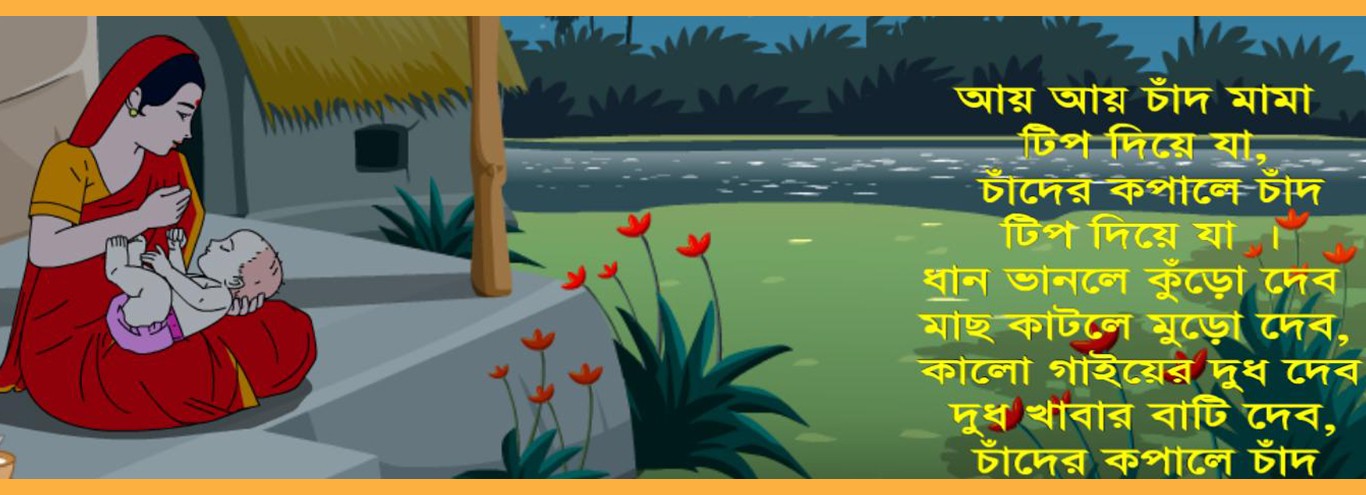মোদের গরব, মোদের আশা, আ মরি বাংলা ভাষা !
মাগো তোমার কোলে, তোমার বোলে, কতই শান্তি ভালবাসা !
…
…
ঐ ভাষাতেই প্রথম বোলে, ডাকনু মায়ে ‘মা, মা’ বলে;
ঐ ভাষাতেই বলবো হরি, সাঙ্গ হলে কাঁদা হাসা।
Our pride, our hope, oh wonderful Bengali language
Oh mother, so much peace and love in your embrace and in your words
…
…
In this language, I uttered my first words calling my mother as “Ma”
In this language, I will utter Hari’s name when my tears and laughter end forever.
The Bengali language is truly our pride and hope, as in the immortal words of poet Atulprasad Sen. It is indeed our hope that our newer generations, in our new homeland, develop a love and appreciation for the Bengali language. We hope that they take pride in their heritage as they assimilate in the country of their birth or adoption.
Encouraged by parents who were searching for a way to get their children engaged with the Bengali language in the DFW Metroplex, Mrs. Sipra Chatterjee started Bangla School of Dallas Fort Worth in 1992 with about a dozen students. As it so happened, the DFW Hindu Temple opened its premises in Irving around the same time, and under the guidance of Dr. Shah, Vidya Vikas School was formed as well. It has been 25 years since the Bengali classes began at Vidya Vikas, but the passion and enthusiasm, amongst students and teachers alike, remain infinitely strong
This Bangla class is not like any typical language class. Mrs. Sipra Chatterjee developed the methodology of this class over the course of many years teaching at the Applied Institute of Indian Studies in Kolkata, India, affiliated with the University of Chicago’s South Asian Language Program, as well as private teaching for Ford Foundation, WHO and Oxfam employees. Mrs. Chatterjee taught Bengali to American and European graduate students working on their Masters or PhD theses in India. The pioneering research of her late husband Dr. Suhas Chatterjee, a Professor at the University of Chicago whose book is available on Amazon, largely informs the curriculum of this class designed for students whose native tongue is not Bengali.
The aim of this course is not simply to create grammarians. This course is aimed for those who are already adept at one or more other languages that they primarily use. The goal is not only to enable an ability of basic reading, writing, and speaking in Bengali, but also to impart an appreciation of Bengali literature and the performing arts and an understanding of Indian philosophy and culture. As such, the students do not endure a course of rote memorization of grammatical rules and incessant, meaningless vocabulary. Instead, we introduce them to a few consonants and vowels, enough to read and write a few words even after the very first day. As their newfound ability sparks interest, they are taught a few rhymes to reinforce their learning, inspiring immediate delight from parents and grandparents and enhanced family interest in the curriculum.
At first, the progress of the students will baffle traditionalists. But over time, the children become quite adept at the Bengali language, being able to read and write Bengali on their own using the well-known Sahaj Path series of books by Rabindranath Tagore. They are taught to understand and recite poems by luminary Bengali poets – which they perform with aplomb during the cultural part of every Saraswati Puja. The pièce de résistance, however, is the annual play the children participate in for presentation during the cultural program at Durga Puja. At first glance, the children merely enjoy the fun of the practice sessions, the snacks, the costumes, and the attention they get. Little do they know that the main goal is to imbibe them with lessons not only in the Bengali language but also in the cultural, philosophical, literary, musical, societal and historical context of their Indian heritage like no classroom instruction can.
The mark of a school is in what we leave with our students after they leave the school. As the Bangla class has been around for over twenty-five years now, we have some history. Our former students, when we meet, are appreciative of the opportunity they got to develop their Bengali language skills, through which they get to deepen their connections to their extended family and heritage. We have had former students that have extended what they learnt with college courses in Bengali. We are extremely proud that former students are returning as teachers and advisors to the Bangla class to enhance the experience for newer generations. The future is bright.
Bangla class operates less as a rigid school than as a nurturing, family-oriented environment for our students, a fun and welcoming one whose singular mission is to connect our students to their heritage and develop a love and understanding for the Bengali language and culture. Former students and their families are forever bound to the school and remain engaged with the current students and their families – much like you’d expect an extended Indian family to be. If you like our mission, and how we achieve it, won’t you come and be part of our extended family?



